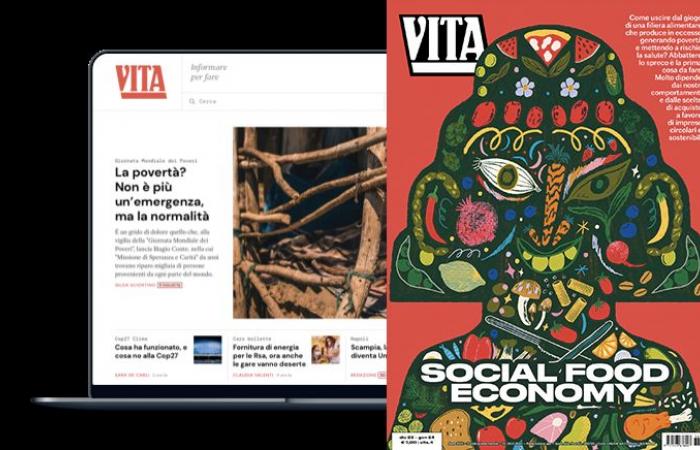The death of Satnam Singh shocks and outrages, putting the spotlight back on a phenomenon of agricultural exploitation that is growing and increasingly widespread in Italy: it affected one in six exploited laborers in 2018, 1 in 4 in 2022 (Placido Rizzotto Observatory), of these 80% are migrants.
The organization WeWorld, he told it in four reports created with Marco Omizzolo and other researchers published in the last two years who, just starting from the Agropontinothey also touched the countryside Sele plain in Campania to the south and the Tuscany to the north.
«Different contexts, different fruit and vegetable supply chains, from fourth range – that of salads washed and ready to be consumed -, to that of grapes for the production of Tuscan wines. There are different shades, from black to grey, because this is how working relationships are characterized: laborers without any contract (illegal work) as in the case of Satnam Singh and laborers with pay slips showing only a small portion of the hours actually worked (grey work). However, the mechanisms and relationships of exploitation are the same, with systems of illicit intermediation of laborers dominated by gangmasters who are flanked, more recently, by “contractor” companies or “landless agricultural companies”, which supply labor mainly of foreign origin through contracts regular, but at very low costs which translate into exploitative conditions”, writes the organization in a note.
«In the Agropontino countryside, Indian, Romanian and Nigerian workers tell us 16-hour working days, 7 days a week for 4.5-5 euros an hour. We work on our knees all day with very short breaks, or at heights in unacceptable safety conditions, in some periods enduring extreme temperatures or in greenhouses where men and women breathe pesticides without personal protective equipment.”
«Another problem was injuries. If you had an injury you couldn’t do anything, they didn’t take you to hospital. This is true, from what I’ve heard from my husband’s friends, for many companies, not just the one I worked for. A worker once cut his finger. The boss gave him some water, a handkerchief and accompanied him home asking him not to go to the emergency room». This is the testimony that WeWorld collected from an Indian laborer from the province of Latina.
«Every now and then there were also some injuries. I myself have fallen several times from the tractor, or into the canals that surrounded the land but there were never complaints, hospitalizations and none of us were ever taken to the emergency room. You never go to the emergency room or if you go the owner tells you that you have to declare that you were injured at home”, says another Indian laborer interviewed together with Marco Omizzolo in the very lands where the drama of the young Satnam Singh took place.
«We told the phenomenon through the female gaze (immigrant farm workers have grown by 200% in ten years, from 2028), where racial discrimination is combined with gender discrimination, and sexual violence is added to the violence perpetrated against men: from insults, to groping, to rape. Men and women treated as tools, objectified in a system of true patronal subordination, discrimination, violence. In the various forms of exploitation, control, silence, humiliation, intimidation and blackmail represent generalized tools of pressure and repression aimed at strengthening isolation and avoiding forms of rebellion”, he declares Margherita Romanellistrategic planning, advocacy and partnership coordinator at WeWorld.
The magazine of social innovation
Subscribe to VITA to read the magazine and access exclusive content and features
«It is in this context», explains WeWorld, «that we must read the death of Satnam Singh. It is the result of a system where the economic objectives of reducing costs to the bone converge, racism in which immigrants, especially if of distant origins, are considered people of inferior categories according to a precise hierarchy on an ethnic basis and a framework of laws , starting from Bossi-Fini on immigration and the subsequent repressive measures that hinder the regularization of migrants in the area, marginalizing them and ghettoizing them even though they represent a workforce widely employed in many sectors such as agriculture. It is embodied in an extractivist economic model, characterized by long and often opaque value chains, highly competitive and dominated by concentrations of market power, including large-scale retail trade, in which the production of agricultural products is remunerated no more than 5% (Ismea , 2019) of the selling price. In some cases, agromafias also find space with a business worth 24.5 billion euros a year in Italy (Eurispes, 2018). We must not forget the cultural connivance of the communities in which migrants live and work which “tolerates” mechanisms of exploitation and ensures benefits not only to agricultural entrepreneurs, but also to those who rent properties to immigrants without contracts, or enjoy irregular childcare services and to low cost. We do not want to remain silent about the fact that the presence on Italian territory of practices that are highly detrimental to dignity and rights continues to be underestimated by the Italian government and the related migration and labor policies».
The situation in the Agropontino area has been reported for some time. It is necessary to raise our voices and make requests for urgent intervention from the institutions. WeWorld stands alongside the migrants who suffer such violence, in the province of Latina, and in other Italian countryside.
«We ask», continues the NGO, «direct and decisive interventions to condemn and eradicate the exploitation of all people in the workplace with the increase of resources to ensure greater controls, a more effective application of the law on gangmastering and safety at work, an effective mechanism that conditions the provision of financing in agriculture to the observance of laws on labor and human rights in line with the new Common Agricultural Policy. It is urgent to ensure complete protection for those who report and for victims. Furthermore, it is necessary to review the legislative framework on immigration which must be aimed at protecting the rights and dignity in particular of marginalized and more vulnerable workers. The Government will also work towards an ambitious Italian law that implements the recent directive on corporate due diligence in the field of human rights, capable of preventing all forms of exploitation and ensuring more complete compensation for victims. As we explain in Business and Human Rights. A system moving towards the EU directive (second report of the permanent observatory on corporate policies and strategies regarding Human Rights, 2024) the law could offer a further valuable tool against gangmastering and serious forms of violation of human rights in business practices. Furthermore, if at the same time we do not act on the cultural processes that produce forms of inhumanity that Singh’s tragedy brings us, we will not be able to make a real change. All this cannot be done without the active involvement of civil society, migrant associations, trade unions, local institutions and communities. As WeWorld, we continue to work on all levels with awareness-raising, reporting, asking institutions, the private sector and consumers to convincingly embrace development models aimed at sustainable well-being and coexistence.”
Opening photo: Latina, demonstration for Satnam Sighn the Indian laborer abandoned with one arm severed on the side of the road in front of his home/Cecilia Fabiano/LaPresse.







